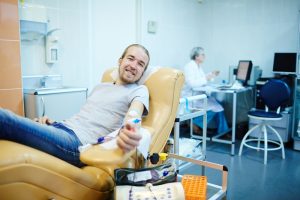 Sweating in general is a way that the body regulates temperature, specifically by reducing body temperature.
Sweating in general is a way that the body regulates temperature, specifically by reducing body temperature.
When exercising vigorously or walking outside in the blazing sun, excessive sweat is to be expected for most people (except for those lucky ones who never seem to never break a sweat!).
However, waking up in the middle night, while lying still in bed, and breaking out in excessive sweat is not normal.
We can define night sweats as sweating in excess of what is required by the body to properly regulate the body temperature.
Underlying Health Issues May Be Cause of Night Sweats
Because you’re obviously not physically exerting yourself while sleeping, night sweats are a concern. They are not caused by a heavy blanket or warm bedroom either. The cause is most likely due to some sort of underlying health issue.
It’s important to get to the root of this problem and try to diminish night sweats because they can really degrade sleep quality, leading to all kinds of other problems.
In addition, it is just downright uncomfortable. Many women wake up with sweat-soaked sheets – so wet that they need to be changed, promptly. What an annoyance.
Just FYI, night sweats are different than hot flashes which are just sudden feelings of warmth and this can occur at any time of day. It seems to be that night sweats are most common in people aged 41 to 55 years.
Common Causes of Night Sweats
 Menopause: Probably the cause that we think of the most is menopause. Hot flashes and night sweats seem to be par for the course when it comes to menopause in women.
Menopause: Probably the cause that we think of the most is menopause. Hot flashes and night sweats seem to be par for the course when it comes to menopause in women.
Because a woman’s fertility is ceasing at this time, she is going through a huge hormonal change.
It is believed that night sweats are caused by the drop in estrogen and progesterone production.
Up to 85% of women who are going through menopause experience night sweats. In fact, hot flashes begin during perimenopause and continue all the way into post-menopause. Most women experience them for more than two decades! Whew!
Unfortunately, a lot of women (64%) report sleeping issues and insomnia during perimenopause and menopause. This is why it may be a good idea for women to undergo hormone replacement therapy (HRT) during this time period in order to improve their sleep and just overall quality of life.
Medications: Watch out for side effects from certain medications such as antidepressants (selective serotonin reuptake inhibitors; SSRIs), steroids, and medicines that lower fevers such as aspirin and acetaminophen.
In addition, caffeine can cause increased sweating as well as alcohol and drug use.
Infection: A lot of infections are associated with night sweats, mainly because they trigger fevers and general overheating of the body. Some examples include both bacterial and fungal infections, tuberculosis, and HIV.
 Hormone Imbalance: Just like with menopause, changes in other hormones can cause night sweats. Our hormone (endocrine) systems are very complex and can be very sensitive to changes.
Hormone Imbalance: Just like with menopause, changes in other hormones can cause night sweats. Our hormone (endocrine) systems are very complex and can be very sensitive to changes.
Some examples of hormone issues that are associated with night sweats include an overactive thyroid (hyperthyroidism), diabetes with elevated blood sugar, and imbalanced sex hormones (such as estrogen or testosterone).
The hypothalamus in the brain regulates body temperature and also stimulates hormone production. If there is a hypothalamic dysfunction, this can lead to hormone imbalance and/or night sweats. Other disorders include pheochromocytoma or a tumor on the adrenal gland and carcinoid syndrome. This is characterized by slow-growing tumors that actually produce hormones.
HRT is a Good Option for Women Approaching Menopause
 In conclusion, if you are suffering from night sweats, it may be best to examine the medications you are on, consider whether you have an underlying infection, and also get your hormone levels checked – especially if you are a woman nearing the time of menopause.
In conclusion, if you are suffering from night sweats, it may be best to examine the medications you are on, consider whether you have an underlying infection, and also get your hormone levels checked – especially if you are a woman nearing the time of menopause.
However, even men can experience night sweats and men should focus on getting their estrogen and testosterone levels checked. It’s simple to get a comprehensive blood test to look at various hormones. Just contact our clinic to discuss blood tests and get all of your questions answered regarding hormone imbalance and treatment protocols, such as HRT.
Reference
Contact Us For A Fast And Professional Response

- Hormone Therapy with HGH and Testosterone May Effectively Treat Back Pain [Last Updated On: October 19th, 2024] [Originally Added On: August 5th, 2020]
- Sermorelin: Frequently Asked Questions — Sermorelin Facts [Last Updated On: February 23rd, 2025] [Originally Added On: October 26th, 2020]
- What is Sermorelin GHRH? The Facts You Need to Know -- Sermorelin Prescription [Last Updated On: February 14th, 2025] [Originally Added On: October 29th, 2020]
- Does Sermorelin Medication Reverse Aging? [Last Updated On: November 24th, 2024] [Originally Added On: November 21st, 2020]
- 12 Ways to Enhance Sexual Performance in the Bedroom [Last Updated On: March 13th, 2025] [Originally Added On: January 10th, 2021]
- Using Sunlight to Remove Hormones From Our Water [Last Updated On: February 19th, 2025] [Originally Added On: February 10th, 2022]
- Introduction to Sermorelin [Last Updated On: February 9th, 2025] [Originally Added On: February 9th, 2025]

















